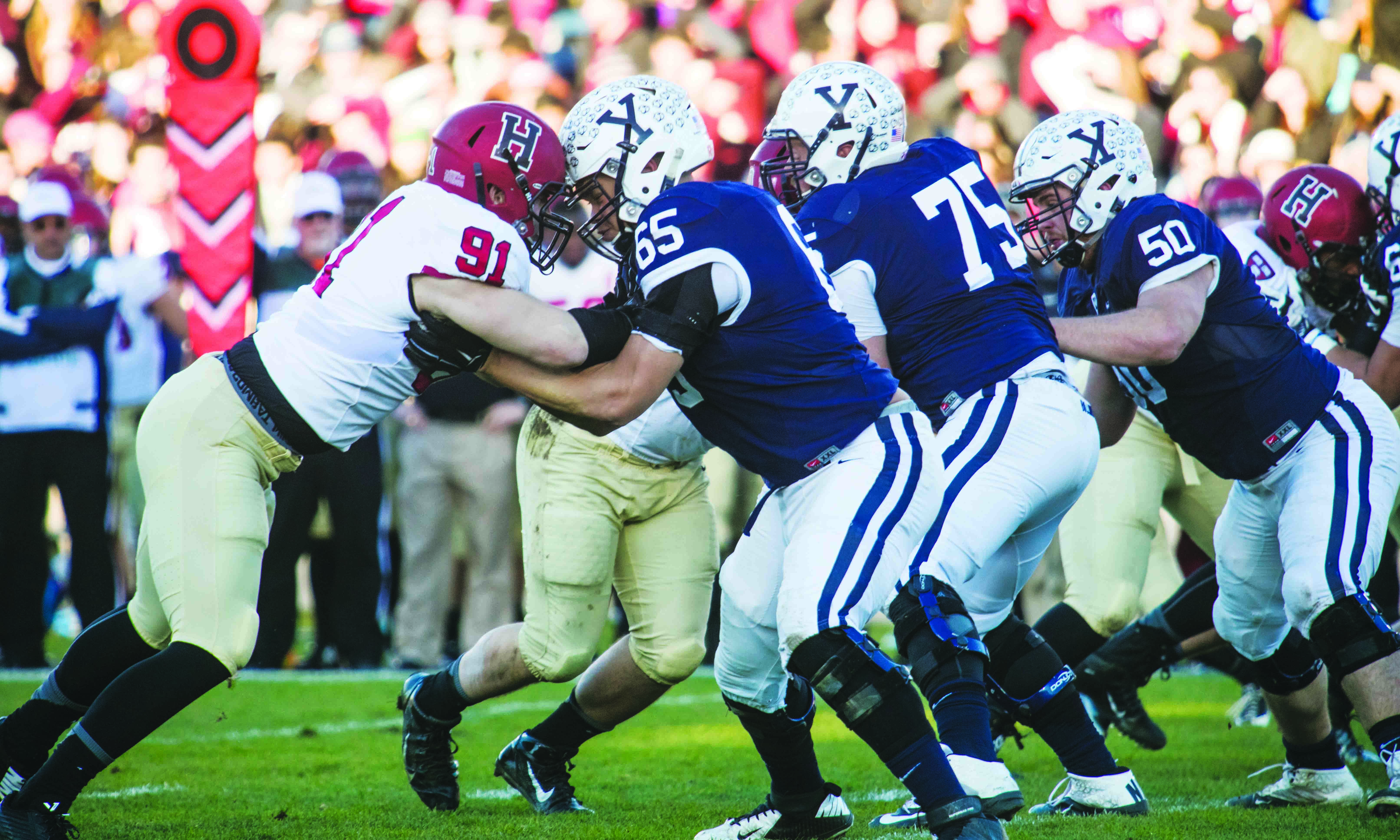
For the first time, the Harvard-Yale football game was played under the lights at the Yale Bowl this past November. But despite the modern twist on the storied tradition, one pattern persisted.
Harvard emerged victorious for the ninth consecutive time, establishing the longest-ever win streak in the history of The Game. The loss marked a somber low point for the Bulldogs, but it is one many believe Yale is on track to overcoming in the years ahead.
Yale head coach Tony Reno joined the team just before the 2012 season, when the Bulldogs were already mired in a stretch of five consecutive losses against the Crimson. To many in the Yale athletics community, Reno’s hiring brought hope for the future. Coming directly from Cambridge, Reno had previously served as an assistant under Harvard head coach Tim Murphy, who had notched 12 consecutive winning seasons at the time of Reno’s departure.
“What Murphy has built at Harvard is very impressive and there’s no question he has done a brilliant job, but I also say that it took him a while,” Director of Athletics Tom Beckett said. “Reno in four years has two winning records and they are back-to-back. So hope springs eternal as Yale looks at Coach Reno.”
But as Reno’s former boss demonstrated in Cambridge, the kind of success Yale supporters are hoping for can sometimes take years to achieve.
Murphy began his tenure at the helm of Harvard’s football team in 1994, and although the coach has now led the Crimson to 15 consecutive winning seasons, that record took time to build. In his first seven seasons directing the team, Harvard had only one winning season — a 9–1 mark in 1997.
In Reno’s first four years at Yale, meanwhile, the coach has seen two consecutive winning seasons with records of 8–2 and 6–4 in the 2014 and 2015 seasons, respectively.
“[The losing streak to Harvard] has been discouraging, but I am optimistic with the direction Reno has been going,” said current presidential candidate George Pataki ’67, whose son Ted Pataki ’05 played wide receiver for the Bulldogs. “Harvard was getting better players, but Reno has taken a huge step towards closing that gap. But Reno has only been here for three years and has not had four full recruiting classes.”
Those “better players” have translated into Harvard’s dominance on the field. Reno pointed out Murphy’s dominance has come against teams other than just Yale — over the last four years, Harvard has amassed a 36–4 overall record in addition to three consecutive Ivy League championships.
However, alumni interviewed agreed that improvements to the program will not come solely from a change in coaching staff. They noted that continued administrative support is crucial in ensuring increased success of Yale athletics.
A former administrator in Harvard’s admissions office, who spoke under the condition of anonymity, pointed to Murphy’s strong lines of communication with the admissions office as a critical aspect for the Crimson’s success on the field.
“The cooperation in the way the admissions business and coaching intersect is an important part of what makes the Harvard football program,” the former administrator said. “Murphy has a very good relationship with the admissions folks, [he] talks a lot with them, he understands what the rules of the game are. [He understands] that he doesn’t control admissions, and he works hard to be faithful to the admissions operation. The recruiting gets done, and it has been pretty effective.”
For some alumni, such progress in the relationship between Yale athletics and University administrators appeared imminent just before Reno’s first season with the Bulldogs. On Aug. 30, 2012, former President Richard Levin announced that he would resign at the end of the 2012–13 academic year. Levin was criticized during his term by supporters of the athletics community due to his policy changes to lower the percentage of athletics recruits at Yale.
Though the number of recruitment slots does not directly impact Ivy League football — each program receives 30 spots per season — those same supporters were optimistic that President Peter Salovey would bring about a renewed support for Yale athletics. However, it is unclear whether Salovey has reversed Levin’s policies since his administration has not publicly disclosed recruitment numbers, though athletes have noted that Yale’s new President has been a more present figure at athletics events during his term.
Former Yale swimmer David Hershey ’62, who has worked closely with the University through his role on the board of the Yale Swimming and Diving Association, said that in his experience, Salovey has been friendlier and more open with the alumni athletic community than Levin was.
“I think [Levin] was a very fine president and I think that he did all that he could to make Yale a better place,” Beckett said of Levin’s approach to Yale and the athletic department in general. “Yet I do think there are some folks that feel that he was not allowing the athletics program to develop to its full extent. Whether that’s a fair assessment or not, time will tell.”
The former Harvard administrator noted that athletics is just one stakeholder of many, partially reliant on the decisions of broader administrative policies.
As far as the athletic department’s role in turning around the trajectory of the Harvard-Yale rivalry, Beckett said he is committed to providing Reno and his staff with the infrastructure needed to produce successful results similar to those Yale has had in the past.
“Harvard is committed as part of the overall branding of the university to athletic excellence, and Yale has to commit to that same degree,” Pataki said. “If Coach Reno continues to be given the support he needs, I’m hopeful this will turn around and we will see Yale embark on a winning streak.”
Yale football maintains a 65–59–8 advantage all-time versus Harvard.







